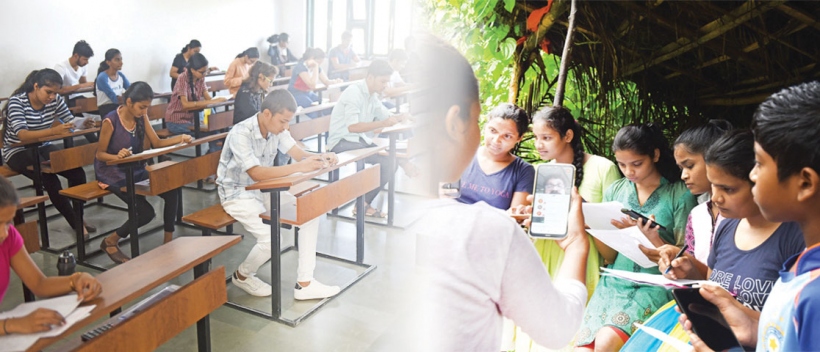
After almost two years of online as well as hybrid schooling, students are set to go for full-fledged offline education from June 6. However, going back to school won’t be easy. As the new academic year is set to get rolling, teachers will have to put in some extra efforts to ensure their students get accustomed to the school environment that they missed out on during long two years of the pandemic.
Slow writing skills, mobile phone addiction, lack of discipline, short attention span, lack of interest among students are some of the major challenges that teachers are going to face as schools reopen. Some students are happy to go back, but others feel that the freedom they enjoyed is at stake. Though teachers are excited to see their students back in the classroom, some children are already worrying about coping with changed habits of daily school. With the possibility of a fourth wave of the pandemic hitting the State somewhere in mid-June or July, parents are also concerned about the safety of their kids.
Like everything else in 2020, the education system too faced the wrath of the Coronavirus pandemic, where education, across India, moved online. Goa was not an exception. Homes turned into classrooms. Phones, computers, laptops, tabs became books and blackboards. Delayed examinations and submission of answer-sheets from home, reduced syllabus, everything that a child wished could have happened someday, very suddenly became a reality. Many students were more than excited.
Though, the physical classes had resumed for secondary students for a certain period, there were quite a few restrictions and the fear of the virus was always there. Now, with students, right from the primary to college set to go back to classroom learning, the transition can be a tad challenging.
“With online classes, the routine of students had changed, their eating habits had changed, their writing skills registered a dip, there was lack of discipline, no proper attention and the list goes on. Now, adapting to the routine of getting up early, attending classes, writing notes, being attentive and doing homework, will be tough in the initial period and we as teachers will have to handle it with care,” former president of Goa Headmasters Association Mariano Valadares said.
Valadares said that students have gone off track and it is here, that teachers will have to put in some extra effort to get the children back on track.
Offline teaching is considered as traditional teaching. In the beginning of online teaching the major factor was adaptability. Now once again adaptability will play a very important role but in the reverse manner as it is about going back to the traditional system of teaching. It is not difficult but it is challenging.
President of All Goa Secondary School Teachers Association Dattatray Naik said, “For the last two years we struggled to get students to adapt to online or hybrid learning and now we have to again get them accustomed to the school environment. We have to get the students back on track, many have gone off track and that is going to be a challenge.”
He said that when classes had resumed in November, they realised that students were finding it tough to sit for a long time on benches and also concentrate in the class. “It was a really tough time, they are no longer used to classroom learning and unfortunately, many students were enjoying that phase,” Naik said.
While classes had resumed partially, many teachers and parents found that most of the students are finding the transition phase difficult and refrain from participating in various class activities due to the lack of human connection.
“My son is in class IX. He was a very active child in school but in the last two years, he has lost all touch. The teachers told me that he is just not ready to participate in any interaction, and looks for an opportunity to go to computer lab or use mobiles, which he used to take in class without our knowledge,” Maya Sardesai, a mother and a counselor said.
The pandemic that struck 2020 brought in drastic changes in the education sector. Though, experts feel that online learning has thrown open the opportunity of hybrid learning, which was never explored in the State’s education era, at the same time the ‘new normal’ missed ‘human touch’ especially for the primary kids.
“The biggest challenge before teachers will be to handle the primary students, especially those who will be entering Class II or Class III without even being understanding the school environment,” President of Goa Headmasters Association Madhav Kharve said. He believes that teachers will have to devote more time and patience while dealing with lower class students.
A young parent, whose son had enrolled in nursery at a reputed school in Vasco on the eve of the second pandemic, said that when she took the child last month to school for re-admission for class II, he was full of tears and could not recognise the teacher, who used to teach him online. “Now, he is just not ready to go to school. Every time we speak about school he starts crying his heart out. He shows me the mobile and says this is school,” Riddhi Naik, a resident of Vasco said.
Gouri Desai, a primary school teacher from Canacona said, “Handwriting of primary students will be affected due to the lack of practice and now, initially it’s going to be bit difficult to make them sit and write. The first few months are going to be tough and we cannot blame the child, everything is going to be new for the kids and considering their age we will have to be more patient.”
There are some teachers, who too, would be attending classes for the first time, as they started their teaching career during the pandemic. “My teaching career started at the peak of COVID pandemic and my experience of engaging with the student so far has been only online. I will be getting my first experience in normal learning environment. Along with handling students, I need to handle myself first to this changing time,” Linda Sebastian, a high school teacher, said.
